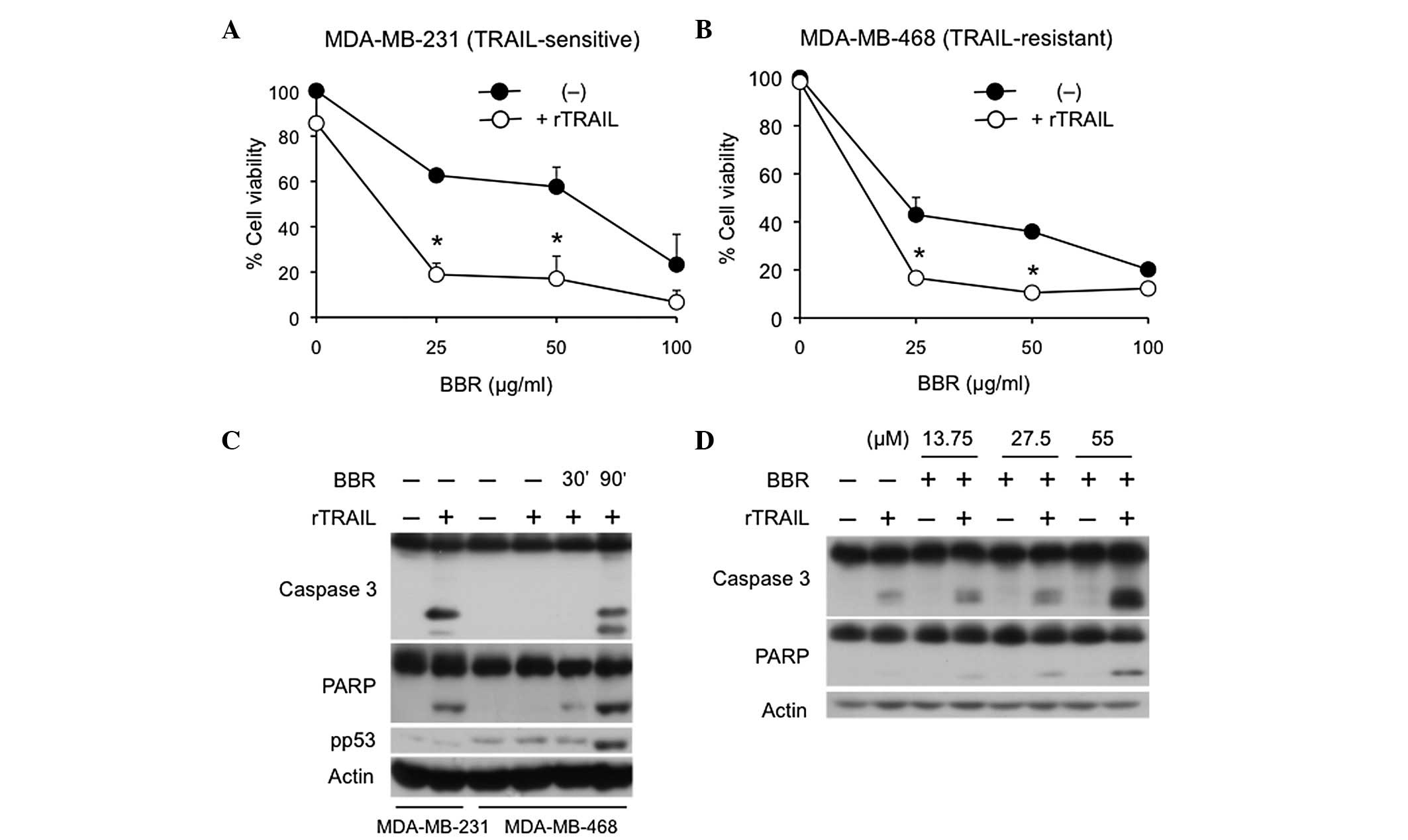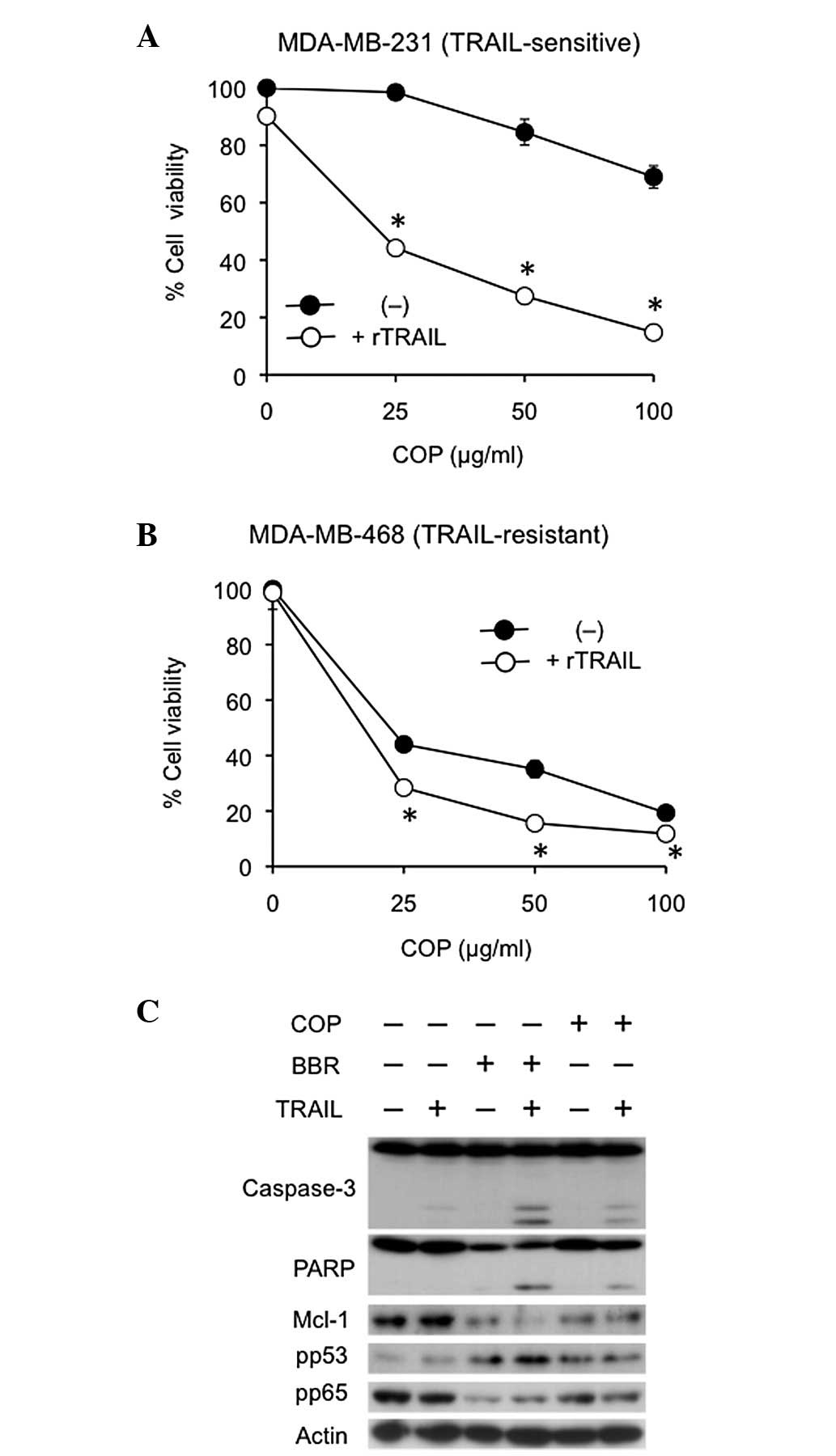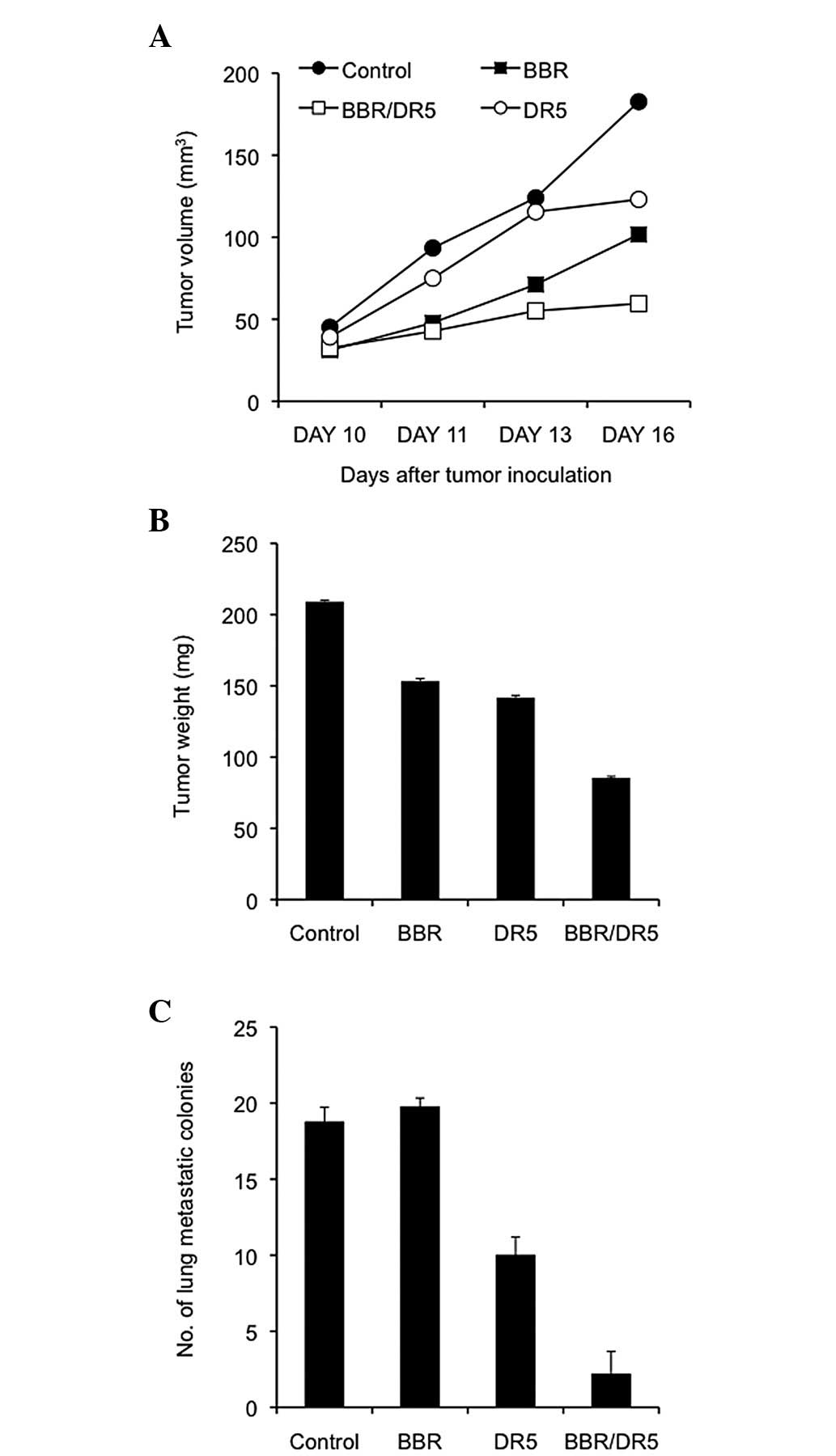|
1
|
Harris JR, Lippman ME, Veronesi U and
Willett W: Breast cancer (1). N Engl J Med. 327:319–328. 1992.
View Article : Google Scholar
|
|
2
|
Wald N, Frost C and Cuckle H: Breast
cancer screening: the current position. BMJ. 302:845–846. 1991.
View Article : Google Scholar : PubMed/NCBI
|
|
3
|
Sotiriou C, Neo SY, McShane LM, Korn EL,
Long PM, Jazaeri A, Martiat P, Fox SB, Harris AL and Liu ET: Breast
cancer classification and prognosis based on gene expression
profiles from a population-based study. Proc Natl Acad Sci USA.
100:10393–10398. 2003. View Article : Google Scholar : PubMed/NCBI
|
|
4
|
MacFarlane M, Ahmad M, Srinivasula SM,
Fernandes-Alnemri T, Cohen GM and Alnemri ES: Identification and
molecular cloning of two novel receptors for the cytotoxic ligand
TRAIL. J Biol Chem. 272:25417–25420. 1997. View Article : Google Scholar : PubMed/NCBI
|
|
5
|
Pan G, O'Rourke K, Chinnaiyan AM, Gentz R,
Ebner R, Ni J and Dixit VM: The receptor for the cytotoxic ligand
TRAIL. Science. 276:111–113. 1997. View Article : Google Scholar : PubMed/NCBI
|
|
6
|
Sheridan JP, Marsters SA, Pitti RM, Gurney
A, Skubatch M, Baldwin D, Ramakrishnan L, Gray CL, Baker K, Wood
WI, Goddard AD, Godowski P and Ashkenazi A: Control of
TRAIL-induced apoptosis by a family of signaling and decoy
receptors. Science. 277:818–821. 1997. View Article : Google Scholar : PubMed/NCBI
|
|
7
|
Yin S, Xu L, Bandyopadhyay S, Sethi S and
Reddy KB: Cisplatin and TRAIL enhance breast cancer stem cell
death. Int J Oncol. 39:891–898. 2011.PubMed/NCBI
|
|
8
|
Lin T, Ding Z, Li N, Xu J, Luo G, Liu J
and Shen J: Seleno-cyclodextrin sensitises human breast cancer
cells to TRAIL-induced apoptosis through DR5 induction and NF-κB
suppression. Eur J Cancer. 47:1890–1907. 2011.PubMed/NCBI
|
|
9
|
Lin T, Ding Z, Li N, Xu J, Luo G, Liu J
and Shen J: 2-Tellurium-bridged β-cyclodextrin, a thioredoxin
reductase inhibitor, sensitizes human breast cancer cells to
TRAIL-induced apoptosis through DR5 induction and NF-κB
suppression. Carcinogenesis. 32:154–167. 2011.
|
|
10
|
Misaki T, Sagara K, Ojima M, Kakizawa S,
Oshima T and Yoshizawa H: Simultaneous determination of berberine,
palmatine and coptisine in crude drugs and oriental pharmaceutical
preparations by ion-pair high-performance liquid chromatography.
Chem Pharm Bull (Tokyo). 30:354–357. 1982. View Article : Google Scholar
|
|
11
|
Kang JX, Liu J, Wang J, He C and Li FP:
The extract of huanglian, a medicinal herb, induces cell growth
arrest and apoptosis by upregulation of interferon-beta and
TNF-alpha in human breast cancer cells. Carcinogenesis.
26:1934–1939. 2005. View Article : Google Scholar : PubMed/NCBI
|
|
12
|
Liu J, He C, Zhou K, Wang J and Kang JX:
Coptis extracts enhance the anticancer effect of estrogen receptor
antagonists on human breast cancer cells. Biochem Biophys Res
Commun. 378:174–178. 2009. View Article : Google Scholar : PubMed/NCBI
|
|
13
|
Kim JB, Yu JH, Ko E, Lee KW, Song AK, Park
SY, Shin I, Han W and Noh DY: The alkaloid Berberine inhibits the
growth of Anoikis-resistant MCF-7 and MDA-MB-231 breast cancer cell
lines by inducing cell cycle arrest. Phytomedicine. 17:436–440.
2010. View Article : Google Scholar : PubMed/NCBI
|
|
14
|
Iizuka N, Miyamoto K, Okita K, Tangoku A,
Hayashi H, Yosino S, Abe T, Morioka T, Hazama S and Oka M:
Inhibitory effect of Coptidis Rhizoma and berberine on the
proliferation of human esophageal cancer cell lines. Cancer Lett.
148:19–25. 2000. View Article : Google Scholar : PubMed/NCBI
|
|
15
|
Tang F, Wang D, Duan C, Huang D, Wu Y,
Chen Y, Wang W, Xie C, Meng J, Wang L, Wu B, Liu S, Tian D, Zhu F,
He Z, Deng F and Cao Y: Berberine inhibits metastasis of
nasopharyngeal carcinoma 5–8F cells by targeting Rho
kinase-mediated Ezrin phosphorylation at threonine 567. J Biol
Chem. 284:27456–27466. 2009.
|
|
16
|
Jantová S, Cipák L, Cernáková M and
Kost'álová D: Effect of berberine on proliferation, cell cycle and
apoptosis in HeLa and L1210 cells. J Pharm Pharmacol. 55:1143–1149.
2003.PubMed/NCBI
|
|
17
|
Wang N, Feng Y, Zhu M, Tsang CM, Man K,
Tong Y and Tsao SW: Berberine induces autophagic cell death and
mitochondrial apoptosis in liver cancer cells: the cellular
mechanism. J Cell Biochem. 111:1426–1436. 2010. View Article : Google Scholar : PubMed/NCBI
|
|
18
|
Kim S, Han J, Lee SK, Choi MY, Kim J, Lee
J, Jung SP, Kim JS, Kim JH, Choe JH, Lee JE and Nam SJ: Berberine
suppresses the TPA-induced MMP-1 and MMP-9 expressions through the
inhibition of PKC-α in breast cancer cells. J Surg Res.
176:e21–e29. 2012.PubMed/NCBI
|
|
19
|
Singh T, Vaid M, Katiyar N, Sharma S and
Katiyar SK: Berberine, an isoquinoline alkaloid, inhibits melanoma
cancer cell migration by reducing the expressions of
cyclooxygenase-2, prostaglandin E2 and prostaglandin
E2 receptors. Carcinogenesis. 32:86–92. 2011. View Article : Google Scholar : PubMed/NCBI
|
|
20
|
Tsang CM, Lau EP, Di K, Cheung PY, Hau PM,
Ching YP, Wong YC, Cheung AL, Wan TS, Tong Y, Tsao SW and Feng Y:
Berberine inhibits Rho GTPases and cell migration at low doses but
induces G2 arrest and apoptosis at high doses in human cancer
cells. Int J Mol Med. 24:131–138. 2009.PubMed/NCBI
|
|
21
|
Zhang X, Gu L, Li J, Shah N, He J, Yang L,
Hu Q and Zhou M: Degradation of MDM2 by the interaction between
berberine and DAXX leads to potent apoptosis in MDM2-overexpressing
cancer cells. Cancer Res. 70:9895–9904. 2010. View Article : Google Scholar : PubMed/NCBI
|
|
22
|
Hwang JM, Kuo HC, Tseng TH, Liu JY and Chu
CY: Berberine induces apoptosis through a mitochondria/caspases
pathway in human hepatoma cells. Arch Toxicol. 80:62–73. 2006.
View Article : Google Scholar : PubMed/NCBI
|
|
23
|
Katiyar SK, Meeran SM, Katiyar N and
Akhtar S: p53 Cooperates berberine-induced growth inhibition and
apoptosis of non-small cell human lung cancer cells in vitro and
tumor xenograft growth in vivo. Mol Carcinog. 48:24–37. 2009.
View Article : Google Scholar : PubMed/NCBI
|
|
24
|
Kheir MM, Wang Y, Hua L, Hu J, Li L, Lei F
and Du L: Acute toxicity of berberine and its correlation with the
blood concentration in mice. Food Chem Toxicol. 48:1105–1110. 2010.
View Article : Google Scholar : PubMed/NCBI
|
|
25
|
Lee SJ, Noh HJ, Sung EG, Song IH, Kim JY,
Kwon TK and Lee TJ: Berberine sensitizes TRAIL-induced apoptosis
through proteasome-mediated downregulation of c-FLIP and Mcl-1
proteins. Int J Oncol. 38:485–492. 2011.PubMed/NCBI
|
|
26
|
Takeda K, Yamaguchi N, Akiba H, Kojima Y,
Hayakawa Y, Tanner JE, Sayers TJ, Seki N, Okumura K, Yagita H and
Smyth MJ: Induction of tumor-specific T cell immunity by anti-DR5
antibody therapy. J Exp Med. 199:437–448. 2004. View Article : Google Scholar : PubMed/NCBI
|
|
27
|
Refaat A, Zhou Y, Suzuki S, Takasaki I,
Koizumi K, Yamaoka S, Tabuchi Y, Saiki I and Sakurai H: Distinct
roles of transforming growth factor-beta-activated kinase 1
(TAK1)-c-Rel and interferon regulatory factor 4 (IRF4) pathways in
human T cell lymphotropic virus 1-transformed T helper 17 cells
producing interleukin-9. J Biol Chem. 286:21092–21099. 2011.
View Article : Google Scholar
|
|
28
|
Kuo CL, Chi CW and Liu TY: Modulation of
apoptosis by berberine through inhibition of cyclooxygenase-2 and
Mcl-1 expression in oral cancer cells. In Vivo. 19:247–252.
2005.PubMed/NCBI
|
|
29
|
Hu JP, Nishishita K, Sakai E, Yoshida H,
Kato Y, Tsukuba T and Okamoto K: Berberine inhibits RANKL-induced
osteoclast formation and survival through suppressing the NF-kappaB
and Akt pathways. Eur J Pharmacol. 580:70–79. 2008. View Article : Google Scholar : PubMed/NCBI
|
|
30
|
Bao L, Haque A, Jackson K, Hazari S, Moroz
K, Jetly R and Dash S: Increased expression of P-glycoprotein is
associated with doxorubicin chemoresistance in the metastatic 4T1
breast cancer model. Am J Pathol. 178:838–852. 2011. View Article : Google Scholar : PubMed/NCBI
|
|
31
|
Kim HS, Kim MJ, Kim EJ, Yang Y, Lee MS and
Lim JS: Berberine-induced AMPK activation inhibits the metastatic
potential of melanoma cells via reduction of ERK activity and COX-2
protein expression. Biochem Pharmacol. 83:385–394. 2012. View Article : Google Scholar : PubMed/NCBI
|

















